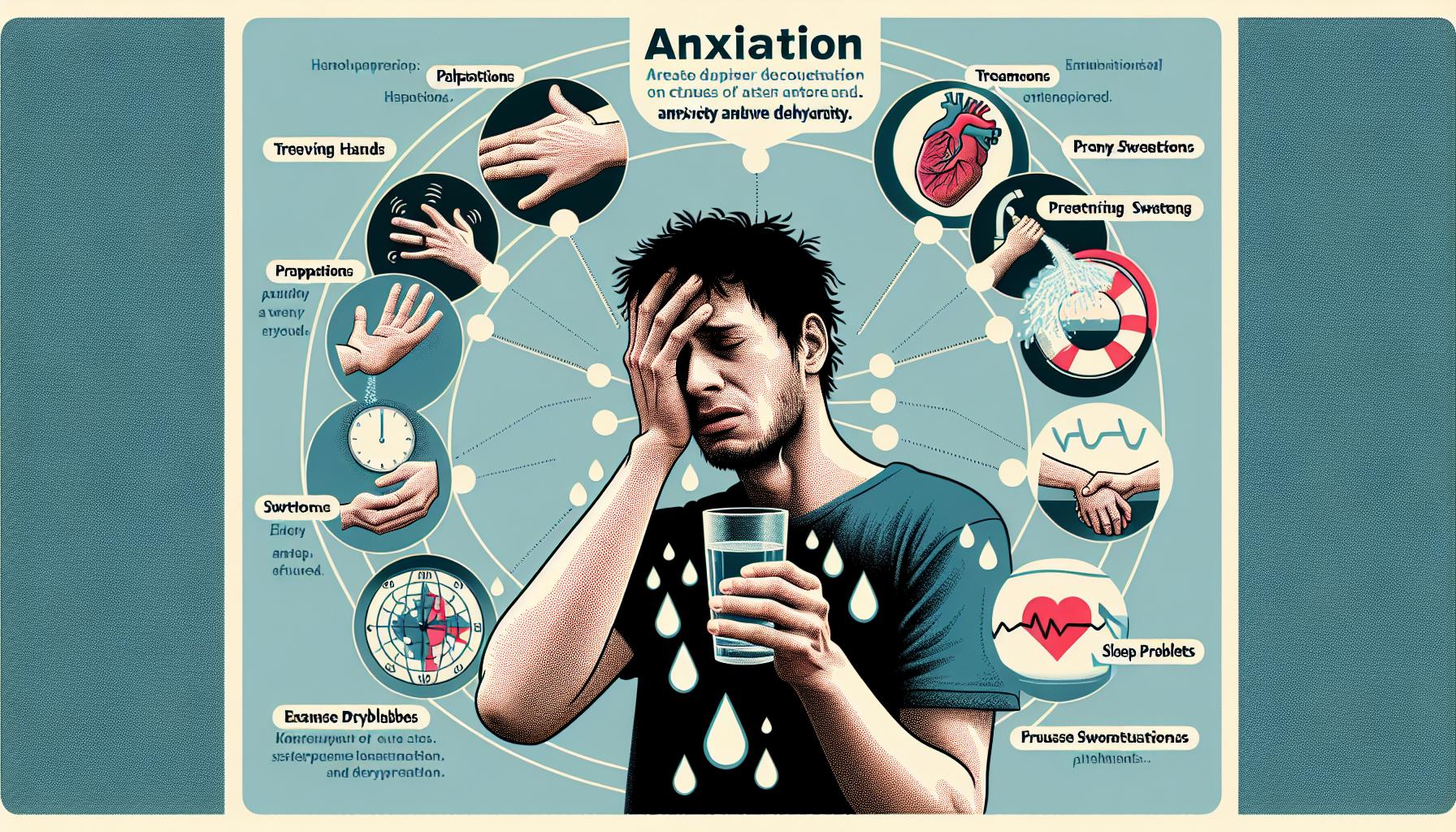Ever find yourself feeling parched after a particularly stressful day? You’re not alone. Anxiety, a common emotional response to stress, can indeed lead to dehydration. In fact, it’s a two-way street – anxiety can cause dehydration, and dehydration can exacerbate anxiety symptoms.
Understanding the link between anxiety and dehydration is crucial for maintaining your overall health. It’s not just about quenching your thirst – it’s about managing your body’s response to stress and ensuring it’s properly hydrated to function at its best. Let’s dive in and explore this fascinating connection further.
Key Takeaways
- Anxiety is more than a mental health issue; it has significant physical impacts including dehydration. This is due to the activation of the body’s stress response system, leading to physiological symptoms like increased heart rate, sweating, and an uptick in digestive activities.
- The connection between anxiety and dehydration relies on the body’s fight-or-flight response. During anxiety episodes, the body uses resources like water more quickly through processes like sweat release and increased digestion, potentially leading to dehydration.
- Dehydration symptoms include dry mouth, excessive thirst, infrequent urination, dark-colored urine, fatigue, and dizziness. Be aware that anxiety might disrupt the body’s natural signals, making it tougher to recognize these symptoms.
- Chronic dehydration can exacerbate anxiety, resulting in a vicious cycle. Therefore, it’s essential to effectively manage hydration levels, stay ahead of thirst, and keep track of your body’s physiological responses during periods of stress.
- Lifestyle changes like regular water consumption, avoiding diuretic drinks, consuming hydrating the food and beverages, and adherence to electrolyte balance can help manage and prevent anxiety-induced dehydration.
- Techniques such as mindfulness, therapy, and medication can help reduce anxiety, and consequently the dehydration that accompanies it. It’s recommended to seek professional help when facing persistent hydration and anxiety issues.
The Impact of Anxiety on the Body

Here’s a fact you may not know: anxiety is more than just a mental health issue. It has a significant impact on your physical wellbeing as well. When anxiety kicks in, your body enters a state of high alert, kicking off a cascade of physiological responses.
One of the critical responses triggered is the activation of your body’s stress response system. This system regulates different functions, such as pulse, breathing rate, and hormone levels. When you’re anxious, this system goes into overdrive, resulting in a series of physical symptoms.
Some of the prominent symptoms include:
- Rapid heart rate
- Shortness of breath
- Sweating
- Dizziness
In particular, the surge of stress hormones can stimulate your excretory systems. This may cause more frequent urination, and even bowel movements, subsequently leading to a loss of fluids in the body. Over time, if you’re not replenishing these lost fluids adequately, it can lead to dehydration.
Additionally, anxiety can often disrupt your eating and drinking patterns. You may forget to drink enough water during an anxiety episode, or you could lose your appetite. Both scenarios, if prolonged, contribute to dehydration.
Here’s a sneak peek into how anxiety-driven dehydration manifests:
| Symptoms of Dehydration |
|---|
| Dry mouth |
| Excessive thirst |
| Infrequent urination |
| Dark-colored urine |
| Fatigue |
| Dizziness |
Understand that anxiety, coupled with dehydration, can create a vicious cycle. Chronic dehydration can exacerbate anxiety symptoms, pushing your body further on the high alert.
Since anxiety affects everyone differently, it’s essential for you to recognize your symptoms. Understanding your body’s response can help you in managing hydration levels effectively during periods of increased anxiety. Keep track of your physical reactions, and always pay attention to your daily water intake. This small yet crucial step can help you maintain your health in the face of anxiety.
Incorporating certain lifestyle changes can also help in managing this condition. While it may seem like a challenge initially, remember, you’re well capable of tackling it! You have the potential to establish healthier habits and techniques for coping with anxiety and maintaining optimal hydration.
So, de-stress and hydrate. Your health is worth it. Let’s explore further.
How Anxiety Can Lead to Dehydration
Anxiety can physically manifest in several ways, and dehydration is a potential effect. The reasons for this are multifaceted.
The connection between your anxiety and dehydration hinges on your body’s stress response system. In stressful situations like when you’re anxious, your body triggers this response. This is essentially survival mode, preparing you for the fight-or-flight response. When you’re in this mode, many of your body’s resources are utilized or depleted more quickly, including water.
One of the primary ways your body uses more water during anxiety is through sweat release. You’ve probably experienced sweating when you’re nervous or stressed – this is your body’s natural tend-and-befriend response in action. However, if you’re not replenishing your body’s water resources, you can quickly find yourself dehydrated.
In addition to increased sweat, anxiety may cause an uptick in your digestive system’s activities. Under anxiety, your digestion can speeds up, requiring more water to process food efficiently. The result could be a higher turnover of fluids, potentially causing fluid loss in your body.
Unhealthy eating and drinking patterns often accompany anxiety. If you’re anxious, you may forget to drink water or eat foods that contribute to hydration. The slight discomfort from dehydration could snowball into more anxiety, resulting in a continuous cycle elevating your risk for chronic dehydration.
Anxiety also disrupts your ability to recognize your body’s signals. Even when your body is screaming out for water, you might not feel thirsty because your anxiety muddles these signals. Ignoring or missing these signals can lead to unknowingly becoming dehydrated.
Recognizing the symptoms of anxiety-induced dehydration such as dry mouth, sleepiness and decreased urine output, is key. Staying ahead of thirst and sipping water throughout the day can help manage hydration effectively, even during times of high anxiety.
Knowledge about your body’s responses during periods of acute anxiety and adhering to healthy hydration practices can contribute to maintaining optimal health. Staying hydrated is as much a physical need as it is a crucial factor to your emotional health. You’ll be able to manage your anxiety better if you’re properly hydrated. In turn, you’ll lower your risk of dehydration from anxiety.
Symptoms of Dehydration Caused by Anxiety
Arising from anxiety, dehydration unveils itself through a few telltale signs. Awareness becomes your first line of defense. Knowing what to look for helps you combat the issue right away and prevent it from escalating further.
Typically, dehydration starts with the mouth feeling dry or parched. Think about those times when your anxiety surged, did your mouth suddenly feel like the desert? That’s because, through the stress response system, your body is depleting its water reserves faster than you can replenish them.
Next, you might notice a relatively reduced frequency of urination. When your body’s water levels drop, it tries to conserve what’s remaining. The result? Less water to be used for cleansing your system or what we often refer to as urination. It’s a good practice to keep an eye on your visits to the bathroom.
Another conspicuous signal of dehydration is increased thirst. However, in the case of anxiety-driven dehydration, this may not be as reliable. Anxiety often disrupts your body’s natural thirst mechanism, making it tougher to recognize thirst signals. You’ll need to train yourself to hydrate consciously, particularly during periods of heightened anxiety.
Dizziness and headaches also fall into the lineup of symptoms. Both can emerge as your body is working overtime to keep up with the stress. Lack of sufficient water only burdens your system further.
Let’s have a quick overview:
| Symptom | Cause |
|---|---|
| Dry mouth | Rapid usage of water reserves |
| Decreased urine output | Water conservation |
| Increased thirst (Less reliable) | Disrupted thirst mechanism due to anxiety |
| Dizziness & headaches | Overburdened physiological systems |
With the identification of these symptoms comes greater control over anxiety-induced dehydration. Remember, hydration is an active participant in maintaining a calm mind and a well-functioning body. Practicing mindfulness in understanding your body’s signals and adhering to a regular hydration schedule are steps in creating that healthy balance.
In the next section, you’ll learn about the practical solutions to manage and prevent dehydration during periods of anxiety. You’re about to discover how having control over anxiety also involves clever tricks of the kitchen, not just the mind. It’s about setting a gentle rhythm, a harmony between your physical needs and emotional health.
Tips for Managing Anxiety-Induced Dehydration

Ensuring that your body remains adequately hydrated during periods of anxiety can feel like a herculean task. However, there are practical steps that you can take to manage and prevent anxiety-induced dehydration.
First, ensure that you consume enough water. Ideally, aim for eight 8-ounce glasses, or about 2 liters, of water each day. This intake should rise when anxiety levels increase, as your body needs extra fluids to compensate for the additional stressors.
Contrary to what most people believe, not all beverages are hydrating. Alcohols and caffeine, for instance, can have diuretic effects and might worsen dehydration. Instead, consider herbal teas, replenishing sports drinks, or even hydrating foods such as fruits or vegetables rich in water.
Allow us to demystify something. Hydration is not solely about fluid intake. It also involves balance with electrolytes — substances in your body that regulate nerve and muscle function and maintain the body’s pH balance. Reach for electrolyte-rich drinks or supplements when you’re feeling dehydrated, especially during periods of heightened anxiety.
Do not overlook the power of you being proactive. Set reminders to drink water and make hydration an integral part of your routine. This strategy can prevent you from running into the dangerous cycle of dehydration and anxiety.
Lastly, remember that managing anxiety itself is as crucial as managing the dehydration symptoms it might cause. Techniques such as mindfulness, therapy, and medication can help reduce anxiety, and consequently the dehydration that accompanies it.
Bear in mind that this advice is not a substitute for professional consultation. Undergoing persistent dehydration and anxiety demands you to reach out to your healthcare professional and discuss your symptoms and management strategies.
Conclusion
You’ve now got a grasp on the link between anxiety and dehydration. It’s clear that staying hydrated is key to managing anxiety-related dehydration. You’ve learned that not all drinks are created equal, and that water, along with electrolyte-rich beverages, are your best bets. You also understand that managing anxiety is a crucial part of the equation. Remember, if anxiety and dehydration persist, it’s important to seek professional help. You’re not alone in this, and there are resources available to help you navigate these challenges. With the right strategies, you can break the cycle of anxiety and dehydration, and live a healthier, more balanced life.
Q1: How can I manage anxiety-induced dehydration?
Consume enough water every day, particularly during periods of high anxiety. Set reminders to drink water and include hydration in your daily schedule. Using electrolyte-rich drinks or supplements can help, while avoiding dehydrating beverages like alcohol and caffeine.
Q2: Are all beverages hydrating?
No, not all beverages are hydrating. In fact, drinks like coffee and alcohol can worsen dehydration. Water and electrolyte-rich drinks are preferable for hydration.
Q3: How essential is electrolyte balance in managing dehydration?
Electrolyte balance is crucial in managing dehydration. Maintaining it with electrolyte-rich drinks or supplements can help minimize dehydration and keep your body functioning normally.
Q4: Apart from hydrating, how else can I manage anxiety-induced dehydration?
Managing the root of the issue, which is anxiety, is critical. Techniques like mindfulness practice, therapy, or medication can be effective. Remember, persistent symptoms of anxiety and dehydration should be addressed by a professional.
Q5: When should I seek professional help for anxiety-induced dehydration?
If you observe persistent symptoms of dehydration even after taking preventive measures or if your anxiety remains uncontrolled, you should seek professional help. Persistent symptoms could indicate a more serious underlying issue.
The post Understanding the Link: Can Anxiety Lead to Dehydration? appeared first on After Anxiety.
Understanding the Link: Can Anxiety Lead to Dehydration? published first on https://after-anxiety.com/

